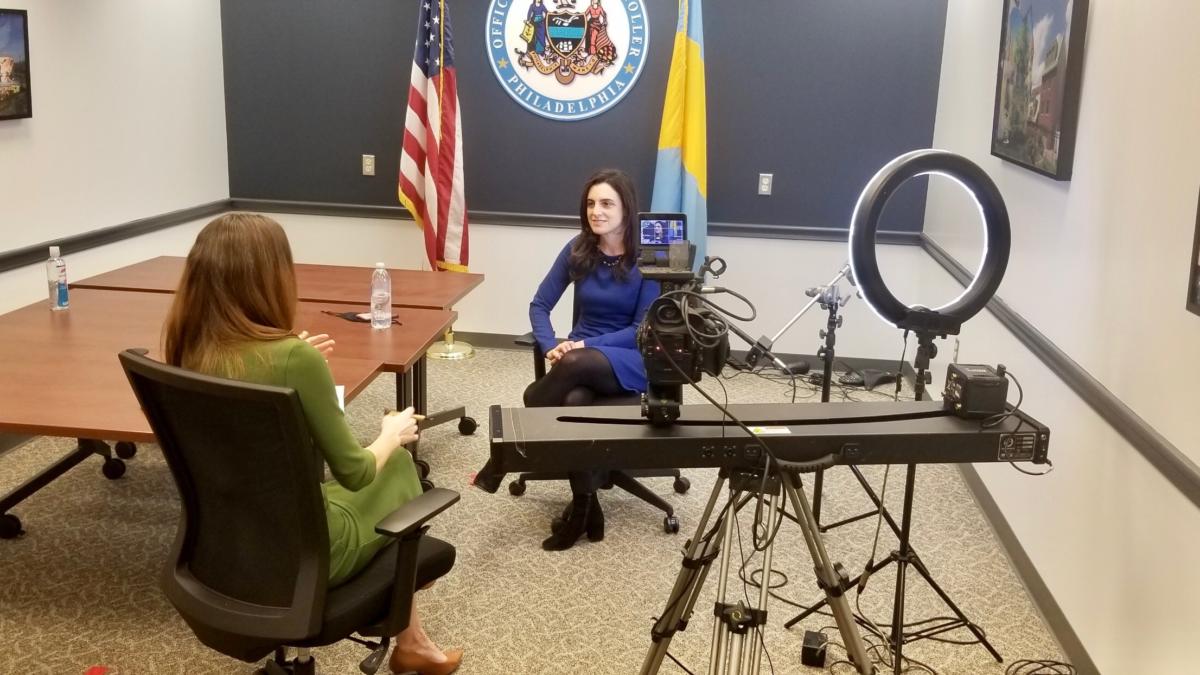If you remember, George Floyd was murdered on a Monday.
Protests broke out in major cities across the country and turned violent the very next day, on a Tuesday. It wasn’t until three days later – that Friday in May – that Philadelphia officials had their first planning meeting ahead of a Saturday scheduled protest downtown.
That was among the most interesting things I learned during an exclusive, on-camera interview with City Controller Rebecca Rhynhart last week.
We talked about just about everything, from the results of her office’s independent review of the city’s response to the chaos last summer to the vaccine rollout debacle to how she really feels about the mayor’s public slights against her.
Having spent nine years in the Michael Nutter and Jim Kenney administrations, respectively, Rhynhart said she noticed each mayor had a distinct leadership style, but she learned a lot along the way that made her want to “disrupt” things more than she could in an appointed position.
As city treasurer and budget director under Nutter and chief administration officer under Kenney, she said she “learned about how the city works and doesn’t work.” That’s what motivated her to resign to run – and why, when she defeated three-time Democratic incumbent Alan Butkovitz despite not having her own party’s endorsement, it was widely considered a major political upset.
Rhynhart ran on the promise of modernizing much of the controller’s office, which she viewed as antiquated, wasteful and entrenched in nepotism.
What this audit found in June 2018 was that the city hadn’t reconciled its largest cash account in three years…And it is supposed to reconcile it daily.
– Rebecca Rhynhart
“One of the biggest surprises for me was an audit my office did right when I first came in in 2018 and it was an audit of internal controls,” she told me.
“What this audit found in June 2018 was that the city hadn’t reconciled its largest cash account in three years…And it is supposed to reconcile it daily. There was $33 million unaccounted for. And this was a big deal. I really took a stance and said, ‘We need to do better than this.’”
Philadelphia’s “internal controls,” which Rhynhart essentially described as “controls over how the city prevents fraud” and “safeguards dollars,” are the worst in the largest top 10 cities, she said.
“The city still has the weakest internal controls, which indicates a higher likelihood of fraud being able to occur. And that should not be the case,” she said.
Asked if members of her own party were to blame for any of that – including a 30-year history of corrupt public officials going to jail or being accused of all sorts of sleazy crimes, Rhynhart admitted a lot needs to change within her own party.
“I do believe in the Democratic Party. I am a Democrat. I think we need good Democrats and I think it’s a fight I have on a regular basis with the Democratic Party. I stand up to the Democrats all the time here in the city…We need to be more efficient and effective, so that each taxpayer dollar goes farther. That’s what government should be doing.”
After Rhynhart released her report, which was conducted by the Ballard Spahr law firm in tandem with AT-Risk International, a risk management consulting firm, she quickly faced backlash from her former boss.
(By the way, Rhynhart insists the Request for Proposal seeking a vendor for the investigation into the city’s response last summer was not a no-bid contract, as some have alleged, but rather, a fair and competitive bidding process.)
I stand up to the Democrats all the time here in the city…We need to be more efficient and effective, so that each taxpayer dollar goes farther. That’s what government should be doing.
– Rebecca Rhynhart
She chided many in law enforcement for what she called a “lack of planning” and a “failure of leadership” all the way up to and including the mayor. In an interview with “Inside Story,” she said there was a “blueprint” that could have been used to prepare for those days of mass protests. Asked outright if Police Commissioner Danielle Outlaw, former Managing Director Brian Abernathy, Mayor Kenney and others willfully ignored any blueprint that might have been available, she said:
“What we found was that there wasn’t planning. It just didn’t happen. And the initial planning for deployment had significantly fewer police officers than we put on duty for the Super Bowl parade. The investigation found that that was a failure of leadership…It was a failure up to the top and just can never happen again.”
This column is the first of a two-part series. Check back next week when I write about Rhynhart’s response to Philly Fighting COVID, the city budget, patronage jobs within the Philadelphia Parking Authority and whether or not she is eyeing the top job in City Hall herself. And check our website in the coming days for my taped interview with Rhynhart inside the Municipal Services Building.
And a correction: In last week’s column titled, “Seven Philadelphians who would make a better mayor,” I wrote that former Mayor Michael Nutter was ineligible to run again due to term limits. According to the city’s Home Rule Charter, mayors are only limited to two consecutive terms. I regret the error.





